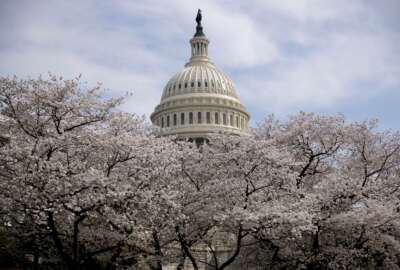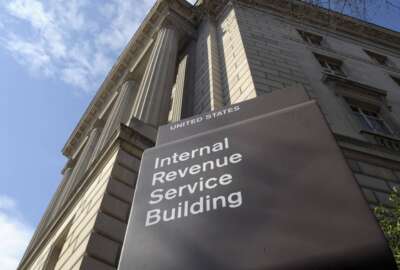What whistleblowers will need from Congress in 2024
Improper payments, fraud in nearly every major federal program, contracting irregularities and false claims. These problems roll on and on, year after year.
Improper payments, fraud in nearly every major federal program, contracting irregularities and false claims. These problems roll on and on, year after year. Whistleblowers who point these and other problems out need several legal reforms, according to the Federal Drive with Tom Temin guest, leading whistleblower attorney, Stephen Kohn of Kohn, Kohn and Colapinto.
Interview Transcript:
Tom Temin And you have written here in the National Law Review, seven reforms. Count them, that you feel are still needed to make sure that whistleblowing does what it’s supposed to do. And let’s run right through them. First on your list was Treasury Department must enact regulations regarding anti-money laundering. How does that affect whistleblowers?
Stephen Kohn Sure. So first, as an introduction, all seven of these reforms have strong bipartisan support. Furthermore, as we’ve pointed out many times, objective and high quality public opinion polling, including the Marist poll, have shown that 80% of the American people support more whistleblower protections. And 1 in 4 likely voters say that a candidate’s position on whistleblowing could impact their decision on whether to support that candidate. So we’re dealing with a situation in which you have seven pending whistleblower reforms, all with strong bipartisan support, strong public support. Yet, all of them are stalled either within an executive agency, which is ignoring the problem, or within Congress that is busy debating whatever they’re debating as opposed to getting a job done. So we start with the money laundering regulations. Last term, Congress unanimously passed, unanimously the Whistleblower Improvement Act for money laundering and sanctions full support. Yet, the Treasury Department has not implemented any regulations. So what does that mean? Whistleblowers don’t know how to file claims, they don’t know how to obtain the benefits of the law, there is nothing on the Treasury Department website explaining this law. So if you think about how bad money laundering is worldwide and it also covers all sanctions violations, Iranian sanctions, Hamas sanctions, ISIS sanctions, Russian sanctions, and a law exists. Yet the Treasury Department has done nothing that we know of to put forward the necessary public rules to guide whistleblowers and even inform them of their rights. That’s unacceptable, and it could change literally in two weeks if someone in the Treasury Department would do their job. So we’re calling on public support, push Treasury to do their job.
Tom Temin All right. Let’s move on to the Justice Department. Since you’re writing since January of 2021, they’ve required people to accept anonymous and confidential whistleblower disclosures. Those regulations aren’t there yet, either.
Stephen Kohn This is one of the most frustrating problems I’ve had to deal with. I’ve actually met with Justice Department investigators on major money laundering case, and they had no idea that federal law required my whistleblower to be anonymous. Now, why is this important? Think about money laundering. It’s an international crime. Often organized crime, drug cartels, drug dealers, terrorist financing. If there’s any group of whistleblowers in the world that need the strongest confidentiality protections, it’s those who are reporting money laundering and sanctions violations. Who has the inside information about Hamas financing, about Iranian financing of terrorism? Who has that? And think about how vulnerable these sources of information are. Congress said as of Jan. 1, 2021, that every one of these whistleblowers can go to the US Department of Justice anonymously and confidentially and make their reports. Yet there’s nothing on a website, no operating procedure, no rule. And the agents responsible for investigating and interacting with these informants don’t even know of the legal requirements. Totally. Completely unacceptable. The Jan. 1 law was completely bipartisan. Totally, there was no opposition in Congress to this right of whistleblowers that was deemed so critical in this important area, yet nothing for now going on three years.
Tom Temin We’re speaking with attorney Stephen Kohn. He’s a partner at Kohn, Kohn and Colapinto. And I guess we can move on to the Securities and Exchange Commission. You’re finding something that they need.
Stephen Kohn We’re having fun now aren’t we.
Tom Temin Yes we are.
Stephen Kohn So there’s a bill again, a bipartisan bill. Equal number of Democrat and Republicans. So you have Senator Chuck Grassley, conservative Republican from Iowa, co-sponsoring it with Elizabeth Warren, Liberal Democrat from Massachusetts, no opposition, other senators from both parties supporting this bill. It would do two things. First, it would permit whistleblowers who report to internal compliance and their supervisors, their audit committees, to be covered and not be subject to retaliation pursuant to the Dodd-Frank act. Right now, if a whistleblower for a company goes to the head of their audit committee and is fired, they have no rights under Dodd-Frank, this would change that. Everyone supports it. Second, there’s massive delays. The SEC program has been very successful. Thousands of people have come in. They’ve awarded many awards to whistleblowers. But what we know is there’s literally hundreds upon hundreds of valid whistleblowers waiting in the queue, sometimes up to 3 to 5 years, just to get their award, which is required by statute. So you have a whistleblower who’s lost their job. The government has collected, say, hundreds of millions of dollars in sanctions. The law says they’re supposed to get an award for their contribution. Yet they could sit unemployed. I even had a client once who had to go on Medicaid for health insurance, total poverty, because they’d lost their job waiting for what was their legal entitlement. So this statute puts a one year requirement on the SEC to make an initial determination. Covers internal, simple changes to make the law work. Total bipartisan support stalled.
Tom Temin And you’re finding the same problem with the IRS. Repeal by delay.
Stephen Kohn IRS takes it to a new level. Their average delay, average that they admit to in their reports is ten years. Essentially, the program is The Walking Dead. What whistleblower can wait ten years for a payment of an award for which they are legally entitled, to which the government has concluded the prosecution? It shows an apathy. It shows an administrative hostility to whistleblowing, a cultural issue that does exist within the federal government. We’ll address that down below, where it just isn’t the priority it should be. And again, this comes back to the Treasury Department that hasn’t done the AML rules the IRS has under Treasury. It isn’t a priority supporting these whistleblowers. So this bill would simply say that if you delay an award to a fully qualified whistleblower for over one year, you have to pay them interest on the money they’re supposed to get paid. And our experts know that the IRS is like tuned to muddy. And if there was an interest requirement, they most likely would prioritize the payments. There’s other reforms in there, but that’s the key. And the delay has been totally undermining the reporting of large scale tax evasion.
Tom Temin All right. And the list goes on. We’ll have to do the lightning round here for your last three priorities for Congress here. Strengthen the False Claims Act. There is a matter for the Commodities Futures Trading Commission and for just simply basic respect by the federal government for whistleblowers.
Stephen Kohn So just to put these three into better context, the CFTC fund, there’s just not enough money in the fund to pay the whistleblower to understand it. The fund is created by the sanctions whistleblowers bring in to the government. No whistleblower, no fund, no money to this fund. But the fund has a low cap. So I would say at least 95% of the sanctions that come into the CFTC just pass on to the federal budget. So when it’s time to compensate the whistleblower, there’s no money there. It’s a very simple reform, full bipartisan support. No one expected the CFTC whistleblower program to be as successful as it’s been. And they have to have a fund to pay the people. Simple. The false claims and the respect to the agencies. All of this is really at the heart that there remains resistance to whistleblowing within the federal bureaucracy. Some agents and officials love whistleblowers, they’re really supportive. They’re doing a fantastic job, but others don’t. So that’s why we’re really pushing this idea of National Whistleblower Day, which has received unanimous support in the US Senate for ten consecutive years. And it’s essentially requiring federal agencies to look at the contributions of whistleblowers, publicize them, and educate their own workforce and the public as to why whistleblowing is important as really a cornerstone to change the underlying culture that impacts all of these problems.
Tom Temin Wow. So Congress can’t even get done what it agrees on. Now it’s easy to see why they can’t get done what they don’t agree on, I guess.
Stephen Kohn What’s so frustrating about this is that you have some really good laws on the books, excellent laws, and we see how they can work and how whistleblowers can be fully supported, can be fully compensated. And so then we look at problems within these laws or very technical reforms that are needed to make what is really a good foundation to be effective, not just to some high profile cases, but to the run of the mill average whistleblower just trying to get compensation, just trying to feed their family, just trying to survive and not forced to undergo delays and other roadblocks. So some of these laws are working fantastic. Others are stalled up over 80% of the American people want to see these stronger protection. And it’s so incumbent for people to really raise their voices and say, let’s get the job done.
Copyright © 2025 Federal News Network. All rights reserved. This website is not intended for users located within the European Economic Area.
Tom Temin is host of the Federal Drive and has been providing insight on federal technology and management issues for more than 30 years.
Follow @tteminWFED






